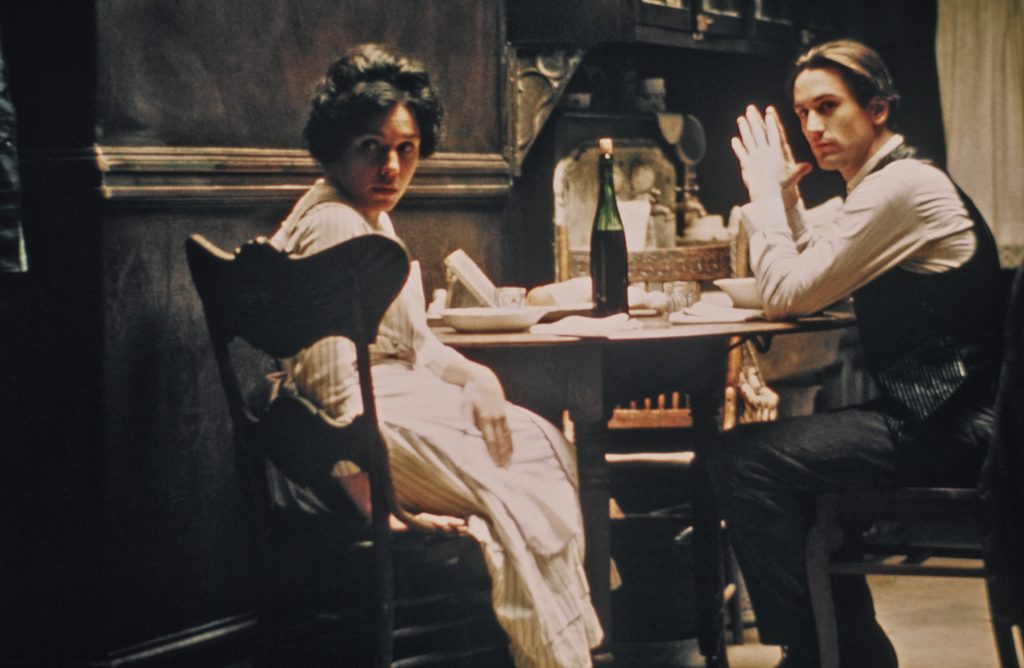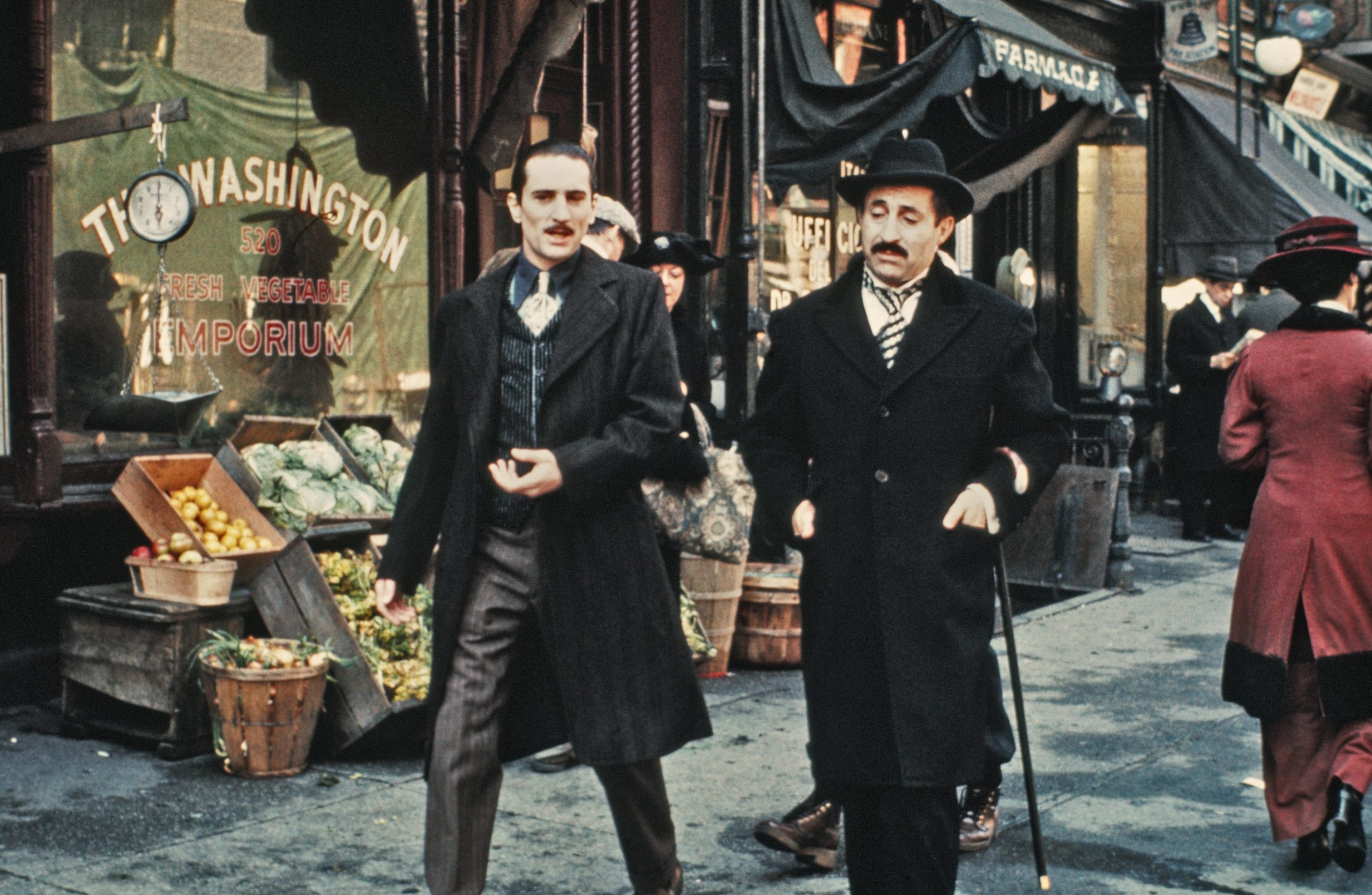A dual-narrative masterpiece that expands the Corleone saga, blending past and present in one of the greatest sequels ever made.
Quick Summary Box
| Category | Details |
|---|---|
| Movie Name | The Godfather Part II (1974) |
| Director | Francis Ford Coppola |
| Cast | Al Pacino, Robert De Niro, Robert Duvall, Diane Keaton, John Cazale |
| Genre | Crime, Drama |
| IMDb Rating | 9.0/10 ⭐ |
| Duration | 3h 22m |
| Where to Watch | Paramount+, Amazon Prime Video (rental) |
| Release Date | December 20, 1974 |
Introduction: A Sequel That Matched, If Not Surpassed, Its Predecessor
Following up on a cinematic masterpiece is no small feat, but The Godfather Part II not only met the towering expectations set by its predecessor—it arguably exceeded them. Released in 1974, two years after The Godfather, this sequel serves as both a continuation and a prequel, deepening the mythology of the Corleone family. Francis Ford Coppola, working once again from a Mario Puzo novel, crafted an expansive, intricately woven narrative that juxtaposes the rise of a young Vito Corleone (Robert De Niro) with the tragic downfall of his son, Michael (Al Pacino).
More than just a crime saga, The Godfather Part II is a profound meditation on power, legacy, and the corruption of the soul. Its dual narrative structure was a storytelling innovation, allowing viewers to witness how power is gained and how it is lost. Nearly five decades after its release, the film remains an unmatched achievement in both storytelling and cinematic craftsmanship.
Plot: A Tale of Two Corleones
The Godfather Part II weaves together two parallel narratives:
- The Rise of Young Vito Corleone (Early 1900s): The film traces the origins of Vito Corleone (Robert De Niro) from his childhood escape from Sicily to his ascension as a formidable mafia boss in New York. Arriving in America as an orphan, young Vito struggles to survive in the slums of Little Italy. His transition from a struggling immigrant to a powerful and respected crime lord is a masterclass in subtle character development, showing how necessity and opportunity shaped the man who would later become Don Corleone.
- Michael Corleone’s Reign and Isolation (1950s): As the head of the Corleone empire, Michael attempts to expand the family’s influence beyond New York, particularly into Cuba. However, betrayal lurks within his own circle, as his dealings with business associates and politicians begin to crumble. The most tragic element of the film is his fractured relationship with his family—his wife Kay (Diane Keaton) grows disillusioned with his ruthlessness, and his brother Fredo (John Cazale) becomes a liability due to his misguided ambition. Michael’s paranoia and thirst for control ultimately drive him to make an irreversible decision regarding his own brother, solidifying his transformation into a ruthless, hollowed-out figure.
The contrast between father and son—the honorable Vito who builds a family empire and the tormented Michael who loses everything—forms the film’s thematic core.
Performance Analysis: Two Unforgettable Portrayals of Corleone Leadership
The Godfather Part II features some of the finest performances in cinematic history, led by Al Pacino and Robert De Niro.
- Al Pacino as Michael Corleone: Pacino delivers a mesmerizing performance, portraying Michael as a man consumed by power and paranoia. Unlike the young war hero introduced in the first film, Michael is now an icy, calculating figure, burdened by the weight of leadership. His subtle expressions—cold stares, clenched jaws, and controlled fury—speak volumes about his internal conflict. His final scenes, sitting alone in contemplation, capture the cost of his unchecked ambition.
- Robert De Niro as Young Vito Corleone: De Niro had the near-impossible task of portraying a younger version of Marlon Brando’s legendary character. Not only does he succeed, but he delivers one of the most nuanced performances of his career. Speaking mostly in Sicilian, De Niro embodies Vito’s quiet intelligence, resourcefulness, and growing authority. His Oscar-winning performance is a testament to the power of understated acting.
- John Cazale as Fredo Corleone: Cazale’s portrayal of Fredo, Michael’s weak and insecure brother, is heartbreaking. His desperation to be respected leads him to betray the family, setting up one of the most devastating moments in the film—his final fishing trip with Michael.
Visual Storytelling: A Cinematic Masterpiece in Two Worlds
Gordon Willis, the cinematographer of The Godfather, returns to create another visually stunning film. The contrast between the two timelines is stark:
- Young Vito’s Story: Shot with warm, golden hues, evoking nostalgia and the romanticized view of old New York. The lighting is softer, emphasizing a sense of growth and opportunity.
- Michael’s Story: Dark, cold, and shadowed—mirroring Michael’s moral and emotional descent. Many shots place Michael in isolated frames, visually reinforcing his growing loneliness.
Coppola’s use of long takes and slow zoom-ins allows tension to build organically. The film’s climactic moments—Michael’s final decision on Fredo’s fate and the flashback of young Vito after his first killing—are among the most haunting in cinema history.

Themes: Power, Betrayal, and the Cost of Legacy
Beyond its crime narrative, The Godfather Part II is a deeply philosophical film exploring:
- The Corrupting Influence of Power: Michael’s fall is inevitable as he prioritizes control over personal relationships.
- Family vs. Business: Unlike Vito, who balanced the two, Michael sacrifices family for power, leading to his ultimate loneliness.
- Betrayal and Paranoia: Trust is fragile in the mafia world, and Michael’s inability to forgive leads to his tragic downfall.
Cultural Impact: The Benchmark for Sequels
When The Godfather Part II was released, it became the first sequel to win the Academy Award for Best Picture, solidifying its place in cinematic history. Its impact is undeniable:
- Established that sequels could equal or surpass their predecessors.
- Inspired countless crime films and TV series (The Sopranos owes much to its storytelling style).
- Michael Corleone’s arc remains one of the most discussed character studies in film history.
Conclusion: A Timeless Masterpiece
Few films achieve the depth, complexity, and emotional weight of The Godfather Part II. As a sequel, it expands and enriches the original; as a standalone film, it is a masterclass in storytelling, acting, and visual composition. Whether one considers it superior to the first film or not, its status as one of the greatest films of all time is unquestionable.
Where to Watch: Available on Paramount+, and for rental on Amazon Prime Video, Apple TV, and Google Play.
If You Enjoyed The Godfather Part II, You Might Also Like:
- The Godfather (1972) – The iconic first chapter of the saga.
- Goodfellas (1990) – A grittier, more kinetic take on mafia life.
- Casino (1995) – Another Scorsese epic about power and betrayal.
- The Irishman (2019) – A modern reflection on crime and consequence by Scorsese.
Final Verdict: ⭐⭐⭐⭐⭐ (5/5) – A cinematic triumph that remains as powerful today as it was in 1974.

1 thought on “The Godfather Part II (1974) Review: A Sequel That Redefined Storytelling in Cinema”